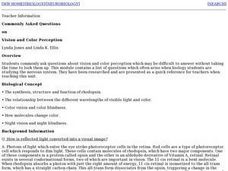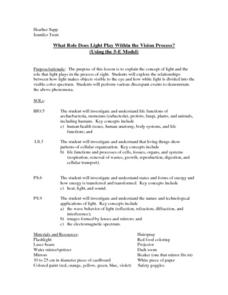Curated OER
Gel-O-Colors!!
What distinguishes the differences between refraction and reflection? Learners identify the properties of light as they mix colored light to create new color variations. As they work they gather data about the properties of light and...
Curated OER
Blinded by the Light
Students recognize that the colors they see are a result of the reflection of light. In this light and color lesson plan, students predict what color will be produced when lights are mixed. They identify the three primary colors and...
Curated OER
Light Energy and Colors
Learners participate in experiments to observe the effects of light energy on colored objects. They conduct various experiments, create a graph and a word bank, record the results, and write an evaluation.
Discovery Education
Through the Looking Glass
Turning white light into colors only takes a little scientific know how! Young scholars create their own spectroscope in a hands-on activity exploring the properties of light. Using a diffraction grating, they discover how white light...
Curated OER
Values Practice Activity
How many values can one colored pencil create? This is the question your budding artists are going to find out. They choose three colored pencils, use the provided boxes to create a light-to-dark value strip, and then answer three...
Curated OER
Color Principles - Hue, Saturation, and Value
High schoolers identify different color models and the application of the color theory. They create different visualizations that compare color models.
Curated OER
What Color is Chlorophyll?
Students observe the interactions of chlorophyll and light. They develop and form their own testable hypotheses. Students predict the color of chlorophyll in various types of plants.
Curated OER
Commonly Asked Questions on Vision and Color Perception
Learners commonly ask question about vision and color perception which may be difficult to answer without taking. They use this module that contains a list of questions which often arise when biology students are studying the nervous...
Mr. E. Science
Light
Where does bad light end up? In a prism! The presentation covers light, mirrors, lenses, and the structure of the eye. It also provides explanations of reflection, refraction, concave and convex mirrors and lenses, and a comparison of...
Curated OER
Keeping Warm When it is Cold: How does a polar bear keep warm?
Students make a model of a polar bear and discuss why fur/skin color is important. They also perform a simple experiment using black and white socks to determine how color affects temperature.
Curated OER
The Science of Color and Light
Students listen to a story about colors and then conduct various experiments to determine how people see colors, identify which colors stand out best from a distance, show the results of mixed colored lighting and explain the phenomenon...
Curated OER
Albedo and Irradiation of Surfaces
Here is a physical science activity where pupils place thermometers inside of a white and a black paper pocket and place them under a lamp. They record and compare the temperature increase over a ten-minute period. Have your class...
Curated OER
Light Week
First graders experiment with prisms to explore sequence of colors of light created.
Curated OER
Which Colored Filter Will Decode a Secret Message?
Students investigate how to create secrete messages through filters. They view pictures with red and green filters and discuss what they observe. They select the color filter that works best to read secret messages. They view pictures...
Curated OER
The Effects of Light and Temperature on the Growth and Development of Plants
Students investigate the effects of light and temperature on plant growth and development. For this plant growth lesson plan, students use radish plants and cover them with different shades of green and red transparencies and observe...
Curated OER
The Energy of Light
Students discuss different ways engineers use light. In this engineering lesson, students are introduced to the properties of light and the way light is used. They view a demonstration of light waves using a slinky, and practice using...
Curated OER
Chlorophyll And The Color Of Light
In this biology and math worksheet, students view a graph of percentage of light reflected by chlorophyll and compose answers to questions on a separate piece of paper. This worksheet would be a fine homework assignment.
Museum of Tolerance
Music Evokes Memories and Emotions
Dim the lights, take a deep breath, and press play to explore the emotions and memories that music elicits. Class members begin using relaxation techniques designed to create a positive listening experience. As music plays, learners...
Curated OER
Light and Shadow
Students compare and draw items with shading based on where a light source is in relation to the object.
Curated OER
What Role Does Light Play Within the Vision Process?
Students are introduced to the relationship between light and vision. In groups, they participate in experiments to discover how different wavelengths are divided in the visible spectrum. They record their answers and discuss their...
National Nanotechnology Infrastructure Network
Making a Liquid Crystal Thermometer
Introduce your classes to a fourth state of matter! Liquid crystals have a colorful sheen that changes based on different physical factors. Learners use this information to create a liquid crystal thermometer where the color of the...
Curated OER
Fast Fact-Finding
Ever wonder why the sky changes color so often? Readers examine an informational excerpt from John Farndon's How the Earth Works. They underline key points as they read and then answer five response questions. Prompts review main points,...
Sargent Art
Picasso and Beyond!
After reviewing the life and art of Pablo Picasso, learners set out to create abstract, cubist, relief portraits. They'll draw, color, paint, and cut out portraits just like the ones Picasso created. The lesson is extremely well written...
Curated OER
Colors, Colors Everywhere
Students mix red, yellow, and blue frosting together to produce secondary colors. Pupils are shown that all colors are made from mixing primary colors of paint together. They discuss the color wheel and spread the "paint" icing on...

























